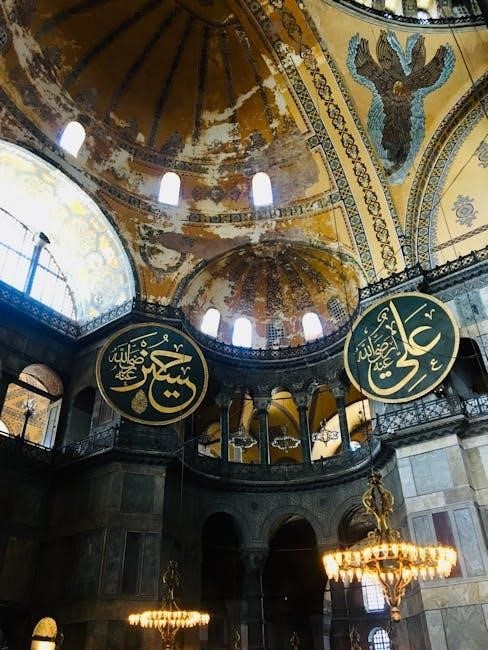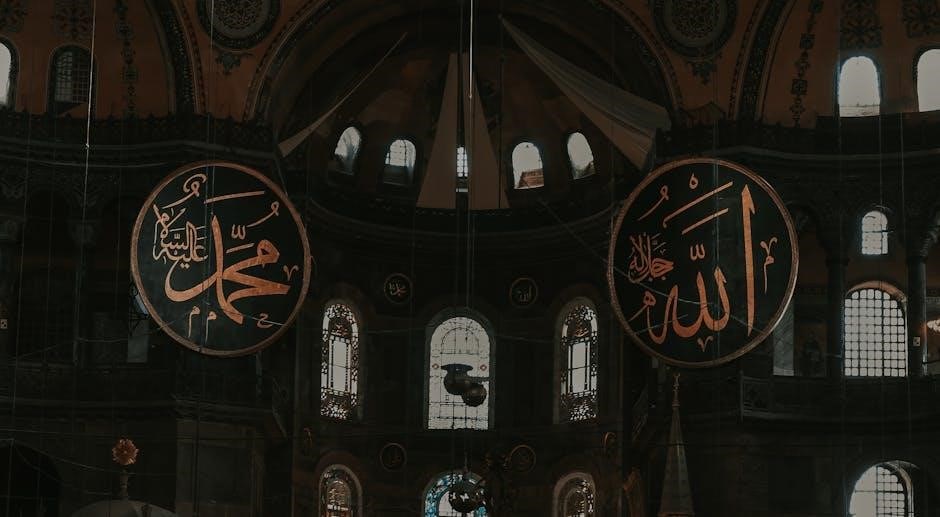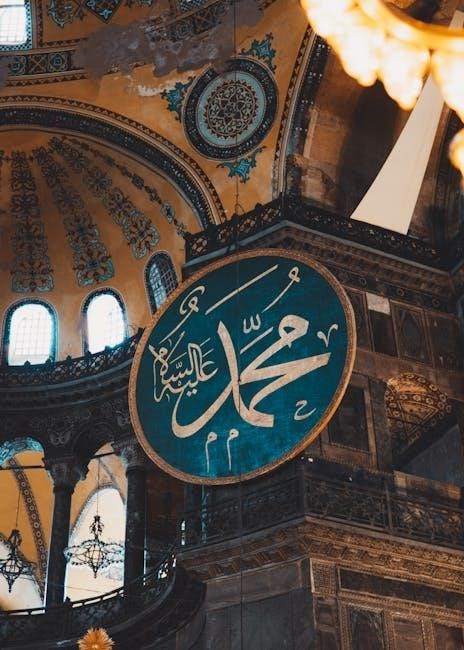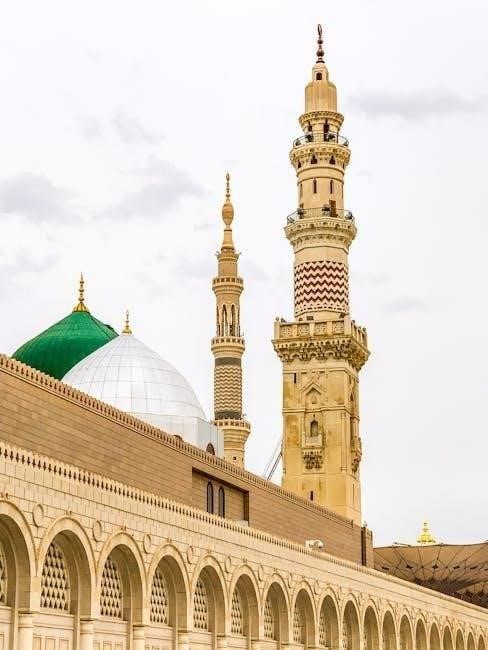99 names of muhammad pdf
- Published
- in PDF
This document explores the 99 names of Prophet Muhammad (PBUH), their meanings, and significance in Islamic faith. It highlights their origin from the Quran and Hadith, offering insights into their spiritual and cultural importance.
Overview of the 99 Names
The 99 Names of Prophet Muhammad (PBUH) are divine attributes that highlight his noble character, spiritual excellence, and unique role as a guide to humanity. These names, such as Muhammad (The Praised One), Ahmad (The Most Commendable), and Haamid (The Praising One), reflect his virtues and blessings. Each name carries profound spiritual and theological significance, offering insights into his mission and divine message. The names are not merely titles but a source of inspiration for followers, emphasizing qualities like mercy, wisdom, and guidance. They are central to Islamic devotion and worship, embodying the Prophet’s timeless legacy.
Significance of the Names in Islamic Faith
The 99 Names of Prophet Muhammad (PBUH) hold profound spiritual and devotional significance in Islam, serving as a means to connect with his divine mission and teachings. These names are deeply rooted in the Quran and Hadith, emphasizing his role as a mercy to mankind and a perfect example of righteous conduct. Reciting and reflecting on these names is believed to bring spiritual blessings, guidance, and closeness to Allah. They inspire Muslims to emulate his noble character, fostering a deeper understanding of his prophetic role and enhancing their faith and devotion. The names are a cornerstone of Islamic spirituality.

Origin and History of the 99 Names

The 99 Names of Prophet Muhammad (PBUH) originate from specific Quranic verses and authentic Hadiths, compiled by scholars to highlight his divine attributes and noble characteristics, reflecting his prophetic mission.
Scriptural Basis: Quran and Hadith
The 99 Names of Muhammad (PBUH) are rooted in the Quran and authentic Hadiths, with specific verses like Surah Al-Fath (48:29) and Surah Al-Ahzab (33:21) referencing his noble attributes. Hadith collections, such as Sahih Muslim and Abu Dawood, further elaborate on these names, emphasizing their divine origin. These scriptural references provide a foundation for understanding the Prophet’s qualities, serving as a guide for Muslims to emulate his character and strengthen their faith.
Historical Development and Compilation

The 99 Names of Muhammad (PBUH) were compiled by Islamic scholars over centuries, drawing from the Quran, Hadith, and classical Islamic texts. Prominent figures like Imam Jazuli and Ibn Arabi contributed to their organization and interpretation. These names reflect the Prophet’s divine attributes and exemplary character, as described in Islamic scriptures. The compilation process involved meticulous verification of scriptural sources to ensure authenticity. Over time, these names became central to Islamic spirituality, with scholars elaborating on their meanings and virtues. The PDF format preserves this rich tradition, making it accessible for modern readers to study and reflect on the Prophet’s noble qualities.

Significance of the 99 Names in Islamic Spirituality
The 99 Names of Muhammad (PBUH) hold profound spiritual significance, serving as a means to connect with the Prophet’s divine attributes and seek blessings. They inspire devotion, guide worship, and deepen faith, offering believers a path to spiritual growth and closeness to Allah through the Prophet’s noble qualities.
Importance in Worship and Supplication
The 99 Names of Muhammad (PBUH) are deeply integrated into Islamic worship and supplication, serving as a powerful means to invoke blessings and seek divine favor. Reciting these names in prayers and devotional practices is believed to strengthen one’s connection to the Prophet and Allah. Many Muslims incorporate these names into their daily supplications, seeking guidance, forgiveness, and spiritual growth. The practice is rooted in the belief that emulating the Prophet’s noble qualities fosters a deeper sense of reverence and humility. This tradition emphasizes the profound impact of the Prophet’s attributes on personal and communal worship, enhancing spiritual devotion and mindfulness.
Influence on Muslim Devotional Practices
The 99 Names of Muhammad (PBUH) profoundly shape Muslim devotional practices, inspiring reverence and spiritual connection. These names are often recited in daily prayers, supplications, and rituals, fostering a deeper bond with the Prophet and Allah. Their recitation is believed to bring blessings, guidance, and emotional solace, enriching personal and communal worship. Many Muslims incorporate these names into their dhikr (remembrance of Allah) and nafl (voluntary) prayers, reflecting their significance in nurturing spiritual growth and mindfulness. This practice underscores the enduring influence of the Prophet’s attributes on Islamic devotion and daily life.

Benefits of Reciting the 99 Names
Reciting the 99 Names of Muhammad (PBUH) brings spiritual growth, blessings, and emotional solace. It strengthens faith, fosters mindfulness, and deepens connection with the Prophet and Allah.
Spiritual Rewards and Blessings
Reciting the 99 Names of Muhammad (PBUH) is believed to bring profound spiritual rewards and blessings. It strengthens one’s connection with Allah and the Prophet, fostering inner peace and divine grace. Many Muslims find solace in these names, as they are thought to carry the power of invocation and mercy. Regular recitation is said to earn divine favor, forgiveness, and protection. The practice is also believed to elevate one’s spiritual status, bringing them closer to Allah and His beloved Prophet. This sacred tradition is deeply rooted in Islamic spirituality and is cherished by devotees worldwide.
Emotional and Psychological Benefits
Reciting the 99 Names of Muhammad (PBUH) offers profound emotional and psychological benefits. It provides comfort, reduces anxiety, and brings peace of mind. The rhythmic recitation creates a calming effect, helping individuals cope with stress and emotional challenges. These names also foster a sense of hope, positivity, and inner strength. By reflecting on their meanings, believers can cultivate resilience, patience, and mental clarity. The practice strengthens emotional well-being by connecting individuals to their faith and fostering a deeper sense of purpose and tranquility in daily life. This spiritual connection is a powerful tool for emotional healing and balance.
Structure and Content of the PDF
The document is meticulously organized, presenting the 99 names in Arabic with their English translations, meanings, and associated virtues. Each name is accompanied by its blessings.
Layout and Design of the Document
The PDF is designed with a clear and organized layout, featuring each of the 99 names in Arabic script, accompanied by their English translations and meanings. The document incorporates a clean typography style, with proper spacing and formatting to ensure readability. Each name is listed sequentially, often with bullet points or numbered lists for easy navigation. The design is simple yet elegant, reflecting the sacred nature of the content. Visual elements like borders or subtle decorative accents may be included to enhance the spiritual appeal. The document is optimized for both digital viewing and print, making it accessible for various purposes. Additionally, the PDF is available for free download in multiple formats, ensuring widespread accessibility for those seeking to learn and reflect on the names. The overall structure and design aim to provide a user-friendly experience, facilitating deeper understanding and devotion.
Translations and Meanings of the Names
The PDF provides bilingual presentations, offering the original Arabic text alongside English translations, ensuring accessibility for non-Arabic speakers. Each name is accompanied by its meaning, derived from classical Islamic sources, enriching the reader’s understanding of the Prophet’s attributes. For instance, “Muhammad” is translated as “The Most Praised,” while “Ahmad” means “The Most Commendable.” The document also includes explanations of each name’s significance, allowing readers to connect deeply with the Prophet’s virtues. This feature makes the content both educational and spiritually enriching for those seeking to explore the names in depth.
Virtues and Blessings Associated with Each Name
The PDF elaborates on the virtues and blessings linked to each of the Prophet Muhammad’s 99 names, emphasizing their spiritual significance. For instance, reciting “Muhammad” is believed to bring divine favor, while “Ahmad” offers commendation. The document highlights how invoking these names can lead to spiritual rewards and blessings. It also provides specific supplications and prayers associated with each name, drawn from authentic Hadith and Quranic references. This section serves as a guide for believers seeking to deepen their connection with the Prophet and attain divine mercy through these sacred names.
Popular Names and Their Meanings
This section highlights popular names like Muhammad (Highly Praised), Ahmad (Most Commendable), and Haamid (The Praising One), exploring their meanings and significance in Islamic culture.

Muhammad: The Most Praised
Muhammad, meaning “The Most Praised,” is the most celebrated name among the 99 names, symbolizing the Prophet’s exalted status. It reflects his role as a leader and guide, embodying divine praise. This name is central in Islamic devotion, often invoked in worship and supplication. Its significance is reinforced by its mention in the Quran and Hadith, emphasizing the Prophet’s universal message of peace and guidance. Reciting this name is believed to bring blessings and inspiration, connecting believers to his noble character and teachings. It remains a cornerstone of Islamic identity and spirituality.
Ahmad: The Most Commendable
Ahmad, meaning “The Most Commendable,” is another revered name of Prophet Muhammad (PBUH), highlighting his noble and praiseworthy character. This name underscores his role as a bearer of truth and justice, reflecting divine commendation. Rooted in the Quran and Hadith, Ahmad symbolizes the Prophet’s mission to guide humanity. Reciting this name is believed to brings blessings and spiritual enlightenment, fostering a deeper connection to his teachings. It embodies the virtues of humility, wisdom, and righteousness, inspiring believers to emulate these qualities in their lives. Ahmad remains a powerful symbol of Islamic values and prophetic excellence.
Haamid: The Praising One
Haamid, meaning “The Praising One,” is a name that reflects Prophet Muhammad’s (PBUH) continuous praise and gratitude to Allah. This name emphasizes his devotion and constant remembrance of God, setting an example for believers to cultivate a life of thankfulness. Rooted in the Quran and Hadith, Haamid highlights the Prophet’s role as a spiritual leader who taught the importance of praising Allah in all circumstances. Reciting this name is believed to inspire humility, gratitude, and a deeper connection to divine worship. It serves as a reminder to embody these virtues in daily life, fostering spiritual growth and closeness to Allah.

Practical Applications of the 99 Names
Muslims use the 99 Names in daily life for spiritual growth and problem-solving. They are recited for blessings, guidance, and inspiration, fostering a deeper connection with Allah.
Daily Recitation and Reflection
Daily recitation of the 99 Names of Muhammad (PBUH) is a revered practice among Muslims, fostering spiritual connection and divine guidance. Many believers incorporate these names into their daily prayers and supplications, seeking blessings and inspiration. Reflection on each name’s meaning deepens understanding of the Prophet’s attributes and teachings. This practice is believed to bring tranquility, strengthen faith, and cultivate a sense of closeness to Allah. Regular recitation is also encouraged in Islamic traditions, as it is seen as a means of seeking mercy, wisdom, and spiritual enlightenment in everyday life.
Use in Islamic Art and Culture
The 99 Names of Muhammad (PBUH) hold a profound place in Islamic art and culture, often featured in intricate calligraphy and decorative designs. They are frequently inscribed in mosques, manuscripts, and religious artifacts, symbolizing divine inspiration and beauty. These names inspire artistic expressions, from illuminated texts to devotional music, enriching cultural and spiritual experiences. Their inclusion in Islamic art serves as a reminder of the Prophet’s virtues and teachings, fostering a deeper connection to faith and heritage. This cultural integration highlights the enduring influence of the 99 Names in Islamic creative traditions and community life.
Cultural and Historical Impact
The 99 Names of Muhammad (PBUH) have deeply influenced Islamic culture and history, inspiring art, literature, and architecture. They are venerated in mosques and manuscripts, symbolizing spiritual and cultural heritage, and continue to unify Muslims worldwide through their timeless significance.
Spread and Popularity of the PDF
The 99 Names of Muhammad PDF has gained widespread popularity globally, with numerous downloads and shares across digital platforms. Its accessibility in multiple formats, such as PDF and TXT, has made it a convenient resource for Muslims seeking spiritual enrichment. The document’s availability on platforms like iStock and scholarly websites highlights its cultural and educational significance. It has also inspired artistic and literary works, further enhancing its reach. This PDF serves as a valuable tool for both personal reflection and communal learning, bridging generations and fostering a deeper connection to the Prophet’s teachings and legacy.
Role in Islamic Education and Dawah
The 99 Names of Muhammad PDF is a vital resource in Islamic education, providing students with a comprehensive understanding of the Prophet’s attributes. It is widely used in madrasas and online courses to teach the significance of each name. Additionally, it serves as a powerful tool in dawah, helping to spread the teachings of Islam and the virtues of Prophet Muhammad. The document’s clear structure and accessible language make it an essential material for both learners and educators, fostering a deeper appreciation of Islamic theology and practice among diverse audiences worldwide.

Challenges and Controversies
Debates surrounding the 99 Names include theological interpretations and cultural sensitivities. Some scholars argue over the authenticity of certain names, while others emphasize their universal spiritual significance.
Theological Debates Surrounding the Names
Theological debates about the 99 Names of Muhammad often center on their interpretation and application. Some scholars discuss the balance between human and divine attributes, while others explore their deeper spiritual implications. Authenticity debates arise regarding certain names, with discussions on their scriptural basis. Despite these discussions, most Muslims accept the names as reflections of the Prophet’s noble character and divine mission. These debates highlight the richness and complexity of Islamic theology, emphasizing the Prophet’s role as a spiritual guide and intercessor. They also underscore the importance of understanding the Names within the broader context of Islamic belief and practice.
Cultural Sensitivities and Misinterpretations
The 99 Names of Muhammad often spark cultural and theological discussions, with sensitivities arising from their interpretation. Misinterpretations can occur due to linguistic or cultural barriers, leading to misunderstandings of their spiritual significance. Some names, when taken out of context, may be misused or misrepresented, causing theological disputes. Additionally, cultural practices surrounding the names vary widely, sometimes leading to debates about authenticity and proper usage. It is crucial to approach these names with respect and understanding to avoid misrepresentation and ensure their revered status in Islamic tradition is upheld across diverse cultural landscapes.
The 99 Names of Muhammad (PBUH) hold profound significance, offering insights into his divine attributes. This PDF serves as a valuable resource for spiritual growth, reflection, and understanding.
Final Thoughts on the 99 Names
The 99 Names of Prophet Muhammad (PBUH) are a timeless treasure, offering deep insights into his divine attributes and character. These names, rooted in the Quran and Hadith, encapsulate virtues like mercy, wisdom, and justice, inspiring believers to emulate them. Reflecting on these names fosters spiritual growth, connecting believers to the Prophet and enhancing their faith journey. The PDF serves as a comprehensive guide, detailing meanings, virtues, and blessings, making it an invaluable resource for personal devotion and communal worship, enriching both individual and collective spiritual practices within the Islamic community.
Encouragement for Further Study and Reflection
Delving into the 99 Names of Prophet Muhammad (PBUH) offers profound spiritual growth and a deeper connection to his noble character. Readers are encouraged to explore the meanings, virtues, and blessings associated with each name, fostering a richer understanding of Islamic teachings. This PDF serves as a valuable resource for personal reflection, daily recitation, and communal worship. By embracing these divine attributes, believers can strengthen their faith and strive to embody the Prophet’s exemplary qualities. Further study and contemplation of these names promise lasting spiritual enrichment and a closer bond with the Prophet’s timeless legacy.
